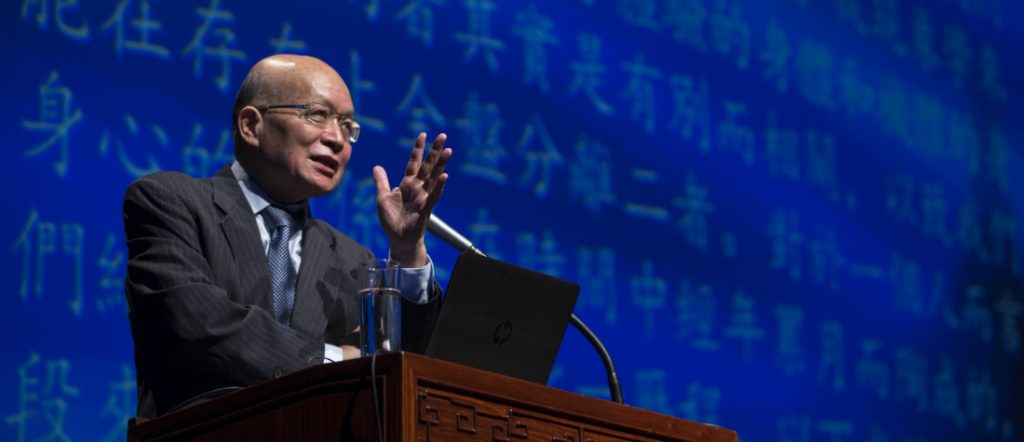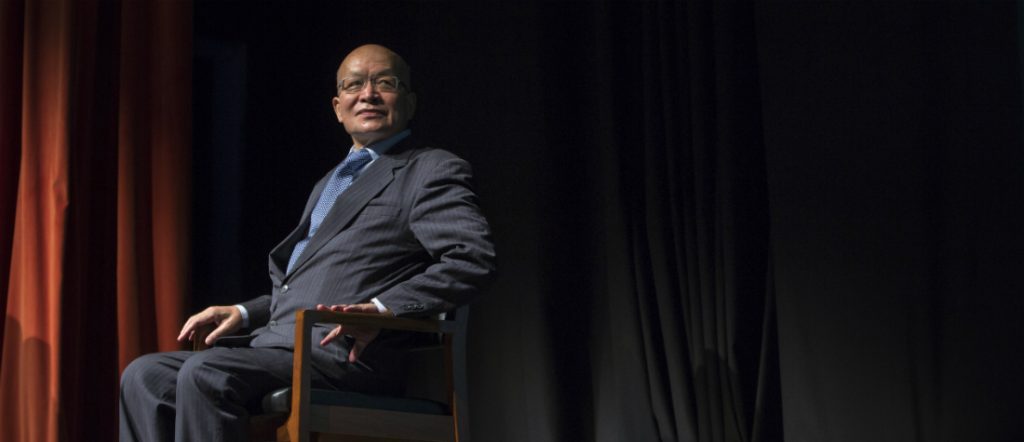
Professor Vincent Shen, a globally respected philosopher and popular teacher, died peacefully on November 14, 2018 surrounded by his family. Appointed to both the Department of East Asian Studies and the Department of Philosophy at U of T, Shen was a prolific scholar whose vast and diverse body of work established important dialogues between Chinese and Western traditions of thought.
Born in Taiwan in 1949, Shen completed his PhD at the Institut Supérieur de Philosophie, Université Catholique de Louvain in 1980, where he worked in the archives of philosopher Edmund Husserl and produced a dissertation on action and creativity in the philosophies of Maurice Blondel and Alfred North Whitehead, “philosophers who are hardly read in Asia,” according to Shen. He taught philosophy at National Chengchi University in Taipei for 20 years before joining U of T in 2000. In his long career, he made an indelible impact on his graduate students, supervising 26 doctoral students in Taiwan and 11 in Toronto, including U of T alumnus David Chai (PhD, 2012), currently assistant professor at the Chinese University of Hong Kong, who remembers Shen with great fondness.
“Vincent was a living embodiment of the Confucian gentleman,” says Professor Chai. “His compassion for others was inviting, his generosity comforting, and his intelligence inspiring. Soft-spoken, with a gentle demeanor, he worked tirelessly to share with others his philosophy of intercultural harmony and reciprocity.”
“The problems that the world is faced with are like dominos. They are interdependent and derive from the root — philosophy. If the first domino — philosophy — collapses, so will the others.” – Vincent Shen, 2018
In addition to his long-standing expertise in Chinese philosophy (particularly Daoism and Confucianism), Professor Shen produced key work in comparative philosophy (the bringing together and comparison of texts from various cultural and linguistics traditions), phenomenology (the study of experience and consciousness), and philosophical problems in technology, culture and religion. His vast publication record, including 29 books and over 150 scholarly articles and book chapters, ranged in thematic focus from interreligious dialogue and cross-cultural translations of non-Western philosophical texts to contemporary questions about aesthetics, cosmology, scientific paradigms, globalization, modernity, spirituality, education and the relationship between humans and technology.
Shen’s “deep knowledge of Chinese philosophy and philology was really unparalleled by scholars around North America today,” says Professor Janet Poole, acting chair of the Department of East Asian Studies.

Professor Shen at the “New Asia Lectures in Confucianism” series, Nov. 11, 2016. Photo: New Asia College, Chinese University of Hong Kong.
At the time of his death, Professor Shen was the holder of the Lee Chair in Chinese Thought & Culture, a position he has held since 2000. Sponsored by the Richard Charles Lee and Esther Yewpick Lee Charitable Foundation, this endowed chair granted Shen the opportunity to pursue his research and teaching at the stellar level his work deserved. He was committed to staying engaged in philosophical circles in Taiwan, Europe, and North America while remaining an active and highly respected member of the Faculty of Arts & Science, and a favourite teacher of both undergraduate and graduate students.
“The combination of the depth and breadth of Vincent Shen’s learning and his remarkable personal warmth meant that his courses in Chinese philosophy were extraordinarily popular at both the undergraduate and graduate level,” says University Professor Arthur Ripstein, acting chair of the Department of Philosophy. “His death leaves a major gap in our program.”
“Alongside Professor Shen’s commitment to research, we witnessed every day his great care and devotion to his students,” says Professor Poole. “His warm guidance and encouragement has left a deep impression on many University of Toronto students over the years and set a high standard for his colleagues to follow.”
Professor Shen’s dedication to education was reflected in remarks he made at the 20th International Society for Chinese Philosophy conference held in Singapore in July of 2017. Insisting that the core purpose of education is to develop students’ ability to reason, Shen advocated for a number of ways in which Chinese philosophy can expand the education of today’s students all over the world, including the ways in which self-discovery, generosity and communicating across differences are key values alongside developing one’s creativity and striving for perfection.
Very recently, Shen highlighted the importance of philosophical inquiry to all aspects of life. “We face today an unprecedented set of problems relating to the environment, the trade war, the ongoing process of spiritual decline and so on,” he told the China Daily newspaper in August of 2018. “The problems that the world is faced with are like dominos. They are interdependent and derive from the root — philosophy. If the first domino — philosophy — collapses, so will the others.”
Shen’s valued administrative service to the university included appointments as Chair and Graduate Chair of the Department of East Asian Studies (2007-2010), and his contributions to the discipline of philosophy worldwide included his role as president of the Chinese Philosophical Association (1995-1999, 1999-2003), of which he was also the executive director at the time of his death.
Professor Shen was planning to retire at the end of this year, and plans were underway in his native Taiwan to hold a conference celebrating his illustrious career in July of 2019 at Fu Jen Catholic University, site of his undergraduate education. He is survived by his wife Johanna Liu, also a professor in the Department of East Asian Studies, his son and daughter, and the grandchildren to whom he was a devoted grandfather.
See also former students remember Professor Vincent Shen for great empathy.
SHARE